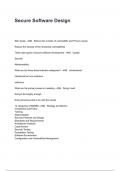Exam (elaborations)
Secure Software Design
- Course
- Institution
Secure Software Design SDL Goals - ANS Reduce the number of vulnerability and Privacy issues Reduce the severity of the remaining vulnerabilities Three main goals of secure software development - ANS Quality Security Maintainability What are the three threat intentio...
[Show more]



